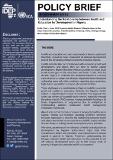| dc.description.abstract | COVID-19 has turned the world upside down. Everything has been impacted. How we live and interact with each other, how we work and communicate, how we move around and travel. Every aspect of our lives has been affected. Although the world is in lockdown, governments, epidemiologists, school principals, entrepreneurs and families around the world are already planning the next steps: how to safely reopen schools and businesses, how to commute and travel without transmitting or contracting infection, how to support those most affected by the crisis – the millions who have lost their livelihoods or their loved ones, how to ensure the already serious inequalities don’t deteriorate further.
The report also provides a glimpse into the challenges facing national statistical offices at the moment. At a time when statistics are most needed, many statistical systems are struggling to compile basic statistics, highlighting once again the need to invest in data and statistics, and the importance of having modern national statistical systems and data infrastructure. The statistics presented in this report are the tip of the iceberg. Readers are encouraged to visit the websites of the contributing organizations, where they can find a wealth of data and high-quality information. As the Secretary General of the United Nations, Antonio Guterres, said: “With common cause for common sense and facts, we can defeat COVID-19 -- and build a healthier, more equitable, just and resilient world”. It is our sincere hope that this report contributes to that cause - with facts based on impartial statistics. Finally, we would like to give special thanks to the CCSA secretariat (UN-DESA) and the statistics team at UNCTAD, without whom this report would not have been possible. | en |
| dc.title | How COVID-19 is changing the world : a statistical perspective | en |
| uneca.subject.fulltaxonomy | UNBIS::ECONOMIC DEVELOPMENT AND DEVELOPMENT FINANCE::STATISTICS::STATISTICAL DATA | en |
| uneca.subject.fulltaxonomy | UNBIS::ECONOMIC DEVELOPMENT AND DEVELOPMENT FINANCE::ECONOMIC CONDITIONS::ECONOMIC RECESSION | en |
| uneca.subject.fulltaxonomy | UNBIS::SOCIAL CONDITIONS AND EQUITY::SOCIAL SCIENCE DISCIPLINES AND METHODOLOGIES::SOCIAL STATISTICS | en |
| uneca.subject.fulltaxonomy | UNBIS::HEALTH::COMPREHENSIVE HEALTH SERVICES::HEALTH INDICATORS | en |
| uneca.subject.fulltaxonomy | UNBIS::GEOGRAPHICAL DESCRIPTORS::AFRICA | en |
| uneca.subject.fulltaxonomy | UNBIS::GEOGRAPHICAL DESCRIPTORS::AFRICA | en |
| uneca.creatorCorporate.fulltaxonomy | Corporate Authors::United Nations. Economic Commission for Africa | en |
| ags.creatorCorporate | United Nations. Economic Commission for Africa | en |
| ags.subjectThesaurus | STATISTICAL DATA | en |
| ags.subjectThesaurus | ECONOMIC RECESSION | en |
| ags.subjectThesaurus | SOCIAL STATISTICS | en |
| ags.subjectThesaurus | HEALTH INDICATORS | en |
| ags.subjectThesaurus | AFRICA | en |
| ags.subjectThesaurus | AFRICA | en |
| ags.descriptionNotes | Commitee for the Coordination of Statistical Activities. | en |
| ags.publisherPlace | Addis Ababa | en |
| ags.publisherName | UN. ECA | en |
| dc.date.accessioned | 2020-05-21T08:21:47Z | |
| dc.date.available | 2020-05-21T08:21:47Z | |
| dc.date.issued | 2020 | |
| dc.identifier.uri | https://hdl.handle.net/10855/43753 | |
| uneca.workflow.processed | true | |
| uneca.language.supported | en | |
| dc.format.extent | 87 p.: ill., maps. | |
| dc.language | eng | |
| dc.type | Reports | |
| ags.creatorCorporate | United Nations. Economic Commission for Africa | |
| ags.subjectThesaurus | STATISTICAL DATA | |
| ags.subjectThesaurus | ECONOMIC RECESSION | |
| ags.subjectThesaurus | SOCIAL STATISTICS | |
| ags.subjectThesaurus | HEALTH INDICATORS | |
| ags.subjectThesaurus | AFRICA | |
| ags.subjectClassification | 02.02.00 ECONOMIC CONDITIONS | |
| ags.subjectClassification | 02.07.00 STATISTICS | |
| ags.availabilityNumber | b11983735 | |
| ags.availabilityNumber | 2020 | |
| ags.availabilityLocation | ECA-HQ | |
| ags.rights.termsofuse | public | |
| ags.JN | b11983735 | |




